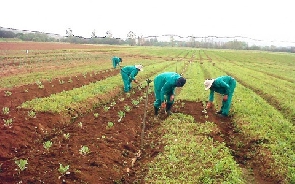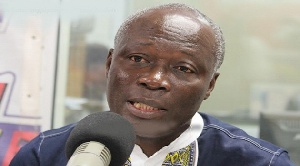Women in farming have been urged to register their lands to access input subsidies provided by the Government under the second phase of the Planting for Food and Jobs (PFJ) Programme.
Mr Yaw Frimpong Addo, the Deputy Minister of Agriculture in charge of Crops, who made the call, noted that women played vital roles in agriculture, describing them as “farm to table” in the food production value chain.
It is, therefore, important that they secured their lands by registering with the agricultural extension directorate to be able to access the required assistance under the PFJ Phase Two, which seeks to transition from direct input subsidy to direct credit system linked to a structured market arrangement.
Mr Addo, speaking at the first anniversary and induction ceremony of the Ghana Association of Female Agricultural and Fish Farming Award Winners (GAFAWAW) in Kumasi, appealed to traditional heads to release lands for young and enterprising women interested in farming.
Agriculture was not only farming and producing food, he said, and women must take up agro-processing as well as other commanding heights in the distribution of inputs produced in the various farming areas.
The Deputy Minister pledged the MoFA’s resolve to work closely with women groups to help address gaps in food systems across the country.
It was on the theme: “Bringing Women to the Decision Table; a Necessity for Accelerated Growth in the Agriculture Sector”.
It was supported by Feed the Future (FTF) Ghana Policy LINK, a five-year project supporting the Government of Ghana to implement evidence-based, inclusive development processes to improve agriculture and food security systems.
Madam Ernestina Osei Tutu, the Chairperson for GAFAWAW, said women’s biggest challenge in farming had been land acquisition, machinery and equipment.
The Association, she noted, had the intention of mobilising its women to share experiences, differences and challenges to find formidable solutions and make farming attractive.
Madam Osei Tutu mentioned that the GAFAWAW was in talks with landowners and chiefs to help lease lands to women farmers.
She appealed to the Government to help more women access basic resources in farming as they formed most of the agricultural population in Ghana to help the nation achieve her food security goals.
Business News of Friday, 9 August 2024
Source: GNA
Women farmers urged to register lands to benefit from PFJ-Two
Entertainment
















